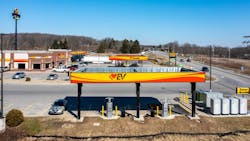Trillium rebrands as Love’s Alternative Energy
Trillium Energy Solutions, part of the Love’s family, is rebranding as Love’s Alternative Energy.
The update is part of the group’s effort to streamline and maximize brand equity across driver-facing offerings in the marketplace, the company reported. Love’s Alternative Energy branding and messaging was introduced during the ACT Expo in Anaheim, California.
“As alternative energy solutions continue to grow, this rebrand is a natural evolution of Trillium’s legacy, and expansion of the Love’s value proposition to provide customer segments with fueling options at public and private facilities across the U.S. and Canada,” Ryan Erickson, Love’s vice president of Alternative Energy, said in a news release. “Trillium brings more than 30 years of experience serving customers in the refuse and transit space, while Love’s has strong relationships with fleets and the public traveling across America’s highways.
“That’s a powerful combination for fleet operators and motorists looking to reduce costs and emissions.”
Love’s late founder, Tom Love, was instrumental in acquiring Trillium in 2016 because he knew innovation would sustain the company and carry it into the future. Trillium’s track record of designing, building, operating and maintaining hundreds of alternative fueling stations nationwide made them a strategic fit into the broader Love’s company growth initiatives.
Today, alternative energy portfolio focus areas include:
- Compressed natural gas (CNG)
- Hydrogen
- Electric vehicle (EV) charging infrastructure
- Low-carbon energy supply from renewable natural gas (RNG)
The company’s commitment to growing its CNG portfolio includes the recent acquisition of 44 public and private CNG stations from U.S. Energy, which brings the Love’s CNG dispensing network to 107 locations nationwide and in Canada. All the U.S. CNG stations are supplied with 100% renewable natural gas (RNG). Within hydrogen, the company is building stations or operates six hydrogen locations across the country and built one of the nation’s first heavy-duty hydrogen vehicle fueling stations. Future efforts in hydrogen will center around designing and building in the transit arena.
For EV charging, Love’s recently installed next-generation chargers at two stores in New York and three in Pennsylvania and will continue building out the EV charging infrastructure across the country.
